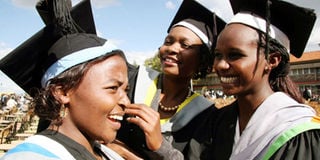Breaking News: At least 10 feared to have drowned in Makueni river
To stand a chance in the world, our education must change

Graduands during a past graduation ceremony at Egerton University. PHOTO | FILE | NATION MEDIA GROUP
What you need to know:
- As we quickly try to come to speed with the level of digitalisation in the world, there is a dire need to bring back art subjects to the classrooms.
- Our children are no longer competing with each other at a national level but a global level in this fast paced global economy.
- To qualify for university, you, therefore, have to complete a one-year foundation course to ‘bridge the gap’ in your knowledge and skill.
The African experience of living in Europe is subjective, but there is a common, silent, unmentioned struggle.
I wish I was not stirred benignly away from arts and craft, home science, and music, when I was in primary school, probably on the objective reason that I would never get a job doing that.
Now, I am not authentic enough. What a profound mistake.
A majority of graduate job applications in the United Kingdom have a designated section of up to 250 words, for you to showcase how well rounded you are as a future employee.
For those born and raised in the UK, they can include their grade 7 flute, grade 8 violin, and the many musical ensembles they have played in.
Who knew there was such a great emphasis placed on the musical instruments you can play?
The art subjects you take up in school are not taken lightly here. It could be a major icebreaker and talking point in your interview if the interviewer is of a similar interest, and even land you the job thousands applied for and got rejected at the application stage.
NATIONAL ANTHEM
Imagine how authentic you will come across in your interview as you share details of the major scales in the national anthem, the estimated growth rings in the tree you passed walking in, the banana fritters you made over the weekend, and the fine backstitch on the shirt you are wearing which you sewed.
As we quickly try to come to speed with the level of digitalisation in the world, there is a dire need to bring back art subjects to the classrooms.
Our children are no longer competing with each other at a national level but a global level in this fast paced global economy.
We need to give them a good fighting chance to compete at this level, and the life skills obtained through the arts are just as important as knowledge from core subjects.
And then there are the exams. To the disappointment of many, your public education is not good enough; it is adequate, but not good enough.
UNIVERSITY EDUCATION
Your KCPE and KCSE certificates do not qualify you for university education in Europe.
These national examinations are not ‘globally recognised’, highlighting that there is a hierarchy of qualifications, and these rank far below the required standard.
To qualify for university, you, therefore, have to complete a one-year foundation course to ‘bridge the gap’ in your knowledge and skill.
Eventually, you complete the foundation course; get into university and graduate, blissfully naive that you have all it takes to get that elusive corporate job, only to start making applications and realise your certificates are also not recognised by these corporations.
You then have to shamefully provide a recognised equivalent for your grades. How then do you compete with those who have the ‘recognised’ qualifications in their favour?
If the education system in place leads to the global door being shut in our faces, this urgently needs much attention.
PARAMOUNT CONSIDERATION
As the ministry of Education holistically reviews the curriculum, changing the national exams to globally recognised qualifications should be of paramount consideration.
Finally, while most of you will wake up tomorrow and go to church, it will not be the same case elsewhere in Europe.
In fact, being asked if you go to church takes you aback. While to you this is assumed, you may never think of asking it.
There is a complicated attitude towards religion and discussions tend to be in hush tones to avoid offending those within your earshot.
So complex is religion that the European Convention of Human Rights had to decide if wearing a crucifix visibly was acceptable, which they did.
The contrary would be in violation of the right to freedom of thought, conscience and religion.
MODERN LIBERALISM
This complexity is partly attributed to the very fashionable modern liberalism and the diverse population which comes with diverse religious views.
More perplexing is that there are even categories of Christians. One, those who believe and regularly attend church services on a Sunday.
Then there are those who believe and do not belong to any congregation, the CEOs. Christmas and Easter only church attendees.
Lastly, those who identify as Christians and never go to church.
It is ironic the missionaries brought us the Christianity, yet belief has fallen away in their own countries.
I wonder if we would have been better off praying facing Mount Kenya and making animal sacrifices so that the Lord may open the heavens and give us a bountiful harvest.





